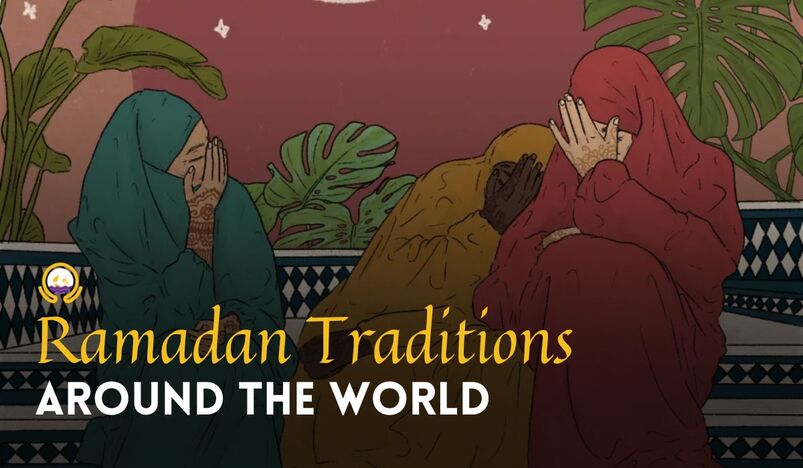
Article Art by @natashahmedx
Celebrated by millions worldwide, Ramadan, an auspicious period for Muslims, occurs annually during the ninth month of the Islamic lunar calendar.
At the heart, Ramadan is celebrated by Muslims for the same reason, to empathize with the plight of millions worldwide who endure poverty and famine, gaining a deeper understanding of their suffering through fasting.
However, as we move across the globe, the Ramadan traditions celebrated by each country tend to differ from one another. These distinctions reflect the unique cultural practices, historical influences, and societal norms embedded within each community.
From the bustling streets of Cairo adorned with vibrant lanterns to the serene villages of Indonesia where communal prayers resonate through the air, here are some unique traditions worldwide capturing the essence of Ramadan.
In Morocco, the Ramadan tradition of the Nafar adds an enchanting element to the atmosphere of the holy month. The Nafar, also known as ‘the town crier’. The Nafar walks down the streets, blowing a horn and calling people to wake them up for Suhoor, the pre-dawn meal. The Nafar's reverberations infuse Moroccan streets with a festive spirit, enhancing the spiritual ambiance for the month of Ramadan for all who partake in its traditions.
Mheibes is a beloved Iraqi tradition celebrated during Ramadan. In this game, groups of men form teams to find a hidden ring among players, all while singing traditional "Baghdadi songs." With each team having up to 50 players, Mheibes fosters community spirit and brings people together in a fun and cultural activity during the holy month. It's not just a game; it's a way for Iraqis to connect with their heritage and strengthen bonds with friends and neighbours.
Though observed in various countries, during Ramadan, predominantly in Nigeria, Zakat is a significant tradition where Muslims give alms to help the less fortunate. Various Islamic organizations collect Zakat throughout the year. The collected funds are then distributed to those in need, such as the poor, widows, and orphans, through Zakat committees. This practice plays a vital role in supporting marginalized communities and reducing poverty across the country.
Chaand Raat, meaning the Night of the Moon, is a cultural event around the tradition of sighting the new moon, marking the end of Ramadan. This lively custom, deeply entrenched in the cultural fabric of South Asian nations such as India, Pakistan, and Bangladesh, commemorates the onset of the new lunar month and the festive beginning of Eid al-Fitr.
In Indonesia, Muslims prepare for Ramadan by observing various rituals the day before. In parts of Central and East Java, a tradition called Padusan is practiced. It involves Javanese Muslims immersing themselves in springs to cleanse their bodies fully. Springs hold special meaning in Javanese tradition and are crucial for purification during Ramadan. The practice is believed to have originated from Wali Songo, a group of influential Islamic scholars who spread Islamic teachings in Java. While elders used to designate sacred springs for Padusan, nowadays, people often use lakes, swimming pools, or their own homes for purification.
During Ramadan, many Muslim countries use cannon firing to signal the start and end of fasting. This tradition is common in places like Qatar, Lebanon, Saudi Arabia, the UAE, Egypt, Turkey, and Pakistan. The booming sound of cannons marks the time to break the fast at Iftar (sunset) and Suhoor (before dawn). It's a centuries-old practice that adds to the cultural richness of Ramadan, uniting Muslims in their observance of this sacred month.
The tradition of lighting colourful lanterns, known as "fanoos" or "fanous," adds a vibrant touch to the celebration in many Muslim communities. These lanterns, originating from countries like Egypt, Palestine, Morocco, and Turkey, symbolize the festive spirit and spiritual enlightenment of the holy month. Initially used to illuminate the path to mosques for Taraweeh prayers, they have evolved into iconic symbols of Ramadan, serving as reminders to spread kindness and generosity, echoing the universal themes of hope and unity that define Ramadan.
As the month of Ramadan unfolds across the globe, these diverse traditions serve as a testament to the richness and unity of the community. Muslims worldwide come together during this sacred month to reflect, connect and spread joy and compassion.
Ramadan traditions not only honor cultural identity but also underscore universal principles that bridge divides and promote unity.
.jpg)
Qatar Secures Place Among the World's Top 10 Wealthiest Nations
.jpg)
Hamad International Airport Witnesses Record Increase in Passenger Traffic

Saudi Arabia: Any visa holder can now perform Umrah

What are Qatar's Labour Laws on Annual Leave?
Leave a comment